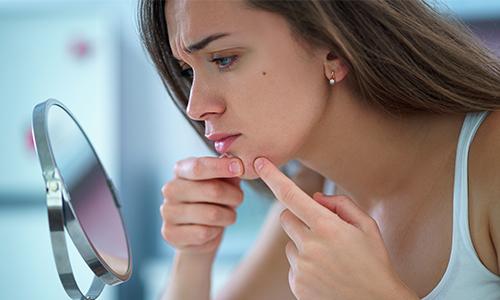
Struggling with acne? You are not alone!
Acne (which is the medical term for “pimples”) is a VERY common skin disorder characterized by chronic (long-lasting) or recurrent (happening over and over again) development of papules (small bumps), pustules (pus-filled bumps), and sometimes nodules (bigger bumps).
It is not life-threatening, but it can lead to permanent scarring, poor self-image, depression, and anxiety.
What causes acne?
Acne (or acne vulgaris, as it is officially known) happens when a hair follicle gets plugged with oil and dead skin cells, then bacteria grows and that area becomes inflamed, forming a pimple.
Why does it affect teenagers so much more than adults?
According to the skin specialists at the American Academy of Dermatology, around 85% of teens get acne.
This is because the glands that produce an oily, waxy substance called sebum (known as sebaceous glands) enlarge during adolescence, and so sebum production increases. Sebum helps to lubricate hair and skin to reduce water loss, but the bacteria that causes acne likes to grow in sebum. There are more sebaceous glands on the mid-back, forehead and chin than anywhere else on the body (with up to 400-900 glands per square centimeter!), which is why acne is so common in those areas.
Important things to know:
• Acne is NOT caused by dirt. Washing your face too much can irritate your skin, rather than help the acne. Use a mild cleanser (some good examples are Cetaphil, a Dove bar or CeraVe) and wash your face gently with this twice a day.
• Research is still being done on the effects of certain diets on acne, but some recent studies have suggested that diets with a high glycemic load (such as sugary foods or soft drinks, white bread, white rice, French fries, etc.) and diets high in milk might worsen acne.
• Don’t pick or squeeze the pimples! This can make the healing process take longer, damage your skin causing scars, and can lead to infection.
• Avoid oil-based makeup and skin products. If you use a facial moisturizer, try to find one labeled as “non-comedogenic” or “won’t block pores.”
• Drying, redness, and peeling are common side effects of many topical acne treatments. If you experience these things, see your healthcare provider to discuss options that could help decrease these side effects.
If your acne bothers you and is not improving with daily washing or over-the-counter treatments, there are many medical treatments easily available at the Quincy Student Health and Wellness Center or your regular medical provider.
